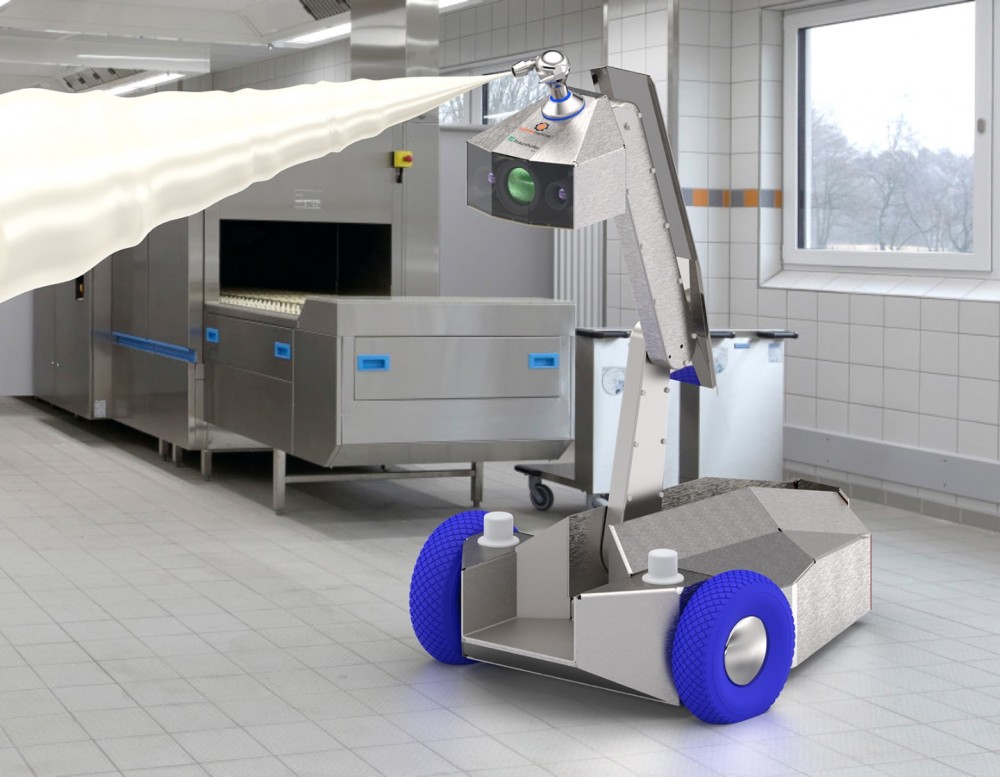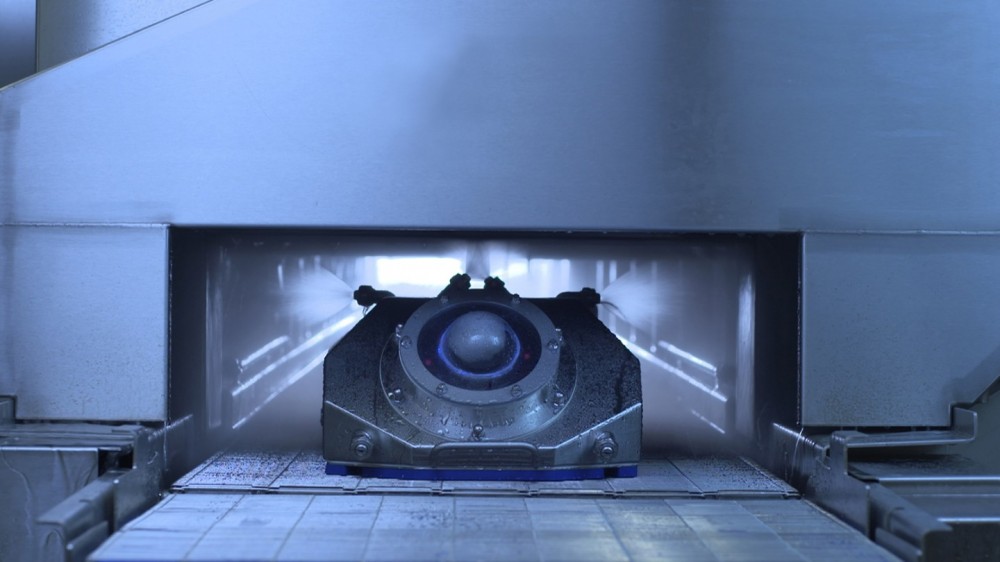Fan Cheng Mobile cleaning robots will raise production hygiene to a higher level
Published on:2020-07-09
Production lines and sanitary areas must be spotless. Absolute cleanliness is essential wherever food and medical devices are processed. Therefore, Fraunhofer researchers designed a mobile cleaning robot, which can work repeatedly to disinfect the equipment and production space to meet the standard. Equipped with self-learning and autonomous power system, the robot can automatically detect the scale degree and select the appropriate cleaning program.

The IVV research team of Fraunhofer Institute of process engineering and packaging in Dresden has developed a modular cleaning robot, and two modified versions of the robot are now in operation. One runs along the conveyor belt through the production line to clean the equipment from the inside; The other has a power wheel and a retractable arm, so that it can move and clean the ceiling, walls and the outer surface of the machine at the same time. It uses radar and ultra wideband radio sensors to navigate the room, identify objects and avoid obstacles.

The extendable robot arm with rotary jet cleaner can be stretched to reach the high position of the production line. This mobile modular machine can spread independently throughout the whole workshop. Its name is mobile cleaning equipment 4.0 (MCD). Fraunhofer IVV collaborated with Fraunhofer iosb-ast of ILMENAU on a research project aimed at studying multi-sensor systems for harsh environments. It should be installed in MCD. The system uses an interesting method called fluorine sensing to find pollutants. The installed sensors will scan and calculate the scale, so that the robot can automatically adjust the cleaning parameters such as pressure and the number of foam cleaners. "The detector uses ultraviolet light to identify fluorescent particles, such as fat, grease and protein, and quantified foam and water according to the determined parameters, such as the thickness and dryness of the residue.
This will be achieved through a self-learning AI system that will select appropriate cleaning parameters and specify treatment steps, "explained Max Hesse, head of the laboratory of Dresden processing technology branch, how the program works. Through simulation, virtual twins can render data during this process. The virtual twin can map the detected dirt to the 3D model of the plant. The water pressure can then be adjusted and reduced according to the distance between the equipment and the surface, all in order to make effective use of resources.

The application scope of MCD is not limited to the food industry. This intelligent robot can well serve other businesses, such as automotive, pharmaceutical, medical engineering, cosmetics and agriculture. In times of crisis such as pandemics, diverse industries can benefit from autonomous robot cleaners. "When there is a shortage of staff, our automation system does have an advantage. About 10% of the staff in food production are dedicated to cleaning," said Max Hesse, head of the research team. With the development of research, such robots are developing, so they will be able to perform more complex cleaning tasks.

The IVV research team of Fraunhofer Institute of process engineering and packaging in Dresden has developed a modular cleaning robot, and two modified versions of the robot are now in operation. One runs along the conveyor belt through the production line to clean the equipment from the inside; The other has a power wheel and a retractable arm, so that it can move and clean the ceiling, walls and the outer surface of the machine at the same time. It uses radar and ultra wideband radio sensors to navigate the room, identify objects and avoid obstacles.

The extendable robot arm with rotary jet cleaner can be stretched to reach the high position of the production line. This mobile modular machine can spread independently throughout the whole workshop. Its name is mobile cleaning equipment 4.0 (MCD). Fraunhofer IVV collaborated with Fraunhofer iosb-ast of ILMENAU on a research project aimed at studying multi-sensor systems for harsh environments. It should be installed in MCD. The system uses an interesting method called fluorine sensing to find pollutants. The installed sensors will scan and calculate the scale, so that the robot can automatically adjust the cleaning parameters such as pressure and the number of foam cleaners. "The detector uses ultraviolet light to identify fluorescent particles, such as fat, grease and protein, and quantified foam and water according to the determined parameters, such as the thickness and dryness of the residue.
This will be achieved through a self-learning AI system that will select appropriate cleaning parameters and specify treatment steps, "explained Max Hesse, head of the laboratory of Dresden processing technology branch, how the program works. Through simulation, virtual twins can render data during this process. The virtual twin can map the detected dirt to the 3D model of the plant. The water pressure can then be adjusted and reduced according to the distance between the equipment and the surface, all in order to make effective use of resources.

The application scope of MCD is not limited to the food industry. This intelligent robot can well serve other businesses, such as automotive, pharmaceutical, medical engineering, cosmetics and agriculture. In times of crisis such as pandemics, diverse industries can benefit from autonomous robot cleaners. "When there is a shortage of staff, our automation system does have an advantage. About 10% of the staff in food production are dedicated to cleaning," said Max Hesse, head of the research team. With the development of research, such robots are developing, so they will be able to perform more complex cleaning tasks.

